Archive for April, 2024
Working as a Foreign Language Assistant in Dublin
- Master of Education
- Ireland, Dublin
- Colaiste Chilliain
- 10/2023 – 03/2024
1. Application/Finding an internship
I first learned about the “Foreign Language Assistant” program through friends. The application process
was comprehensive but straight-forward and needed to be completed by January. It required submission
of a CV, Letter of Motivation, transcript of records, certificate of study, and a university report
(Hochschulgutachten) from a Professor (some documents needed to be submitted in English + German,
this varied according to your chosen destination country). The program encompassed numerous countries
with varying internship durations but Ireland, offering a placement of 6-8 months, resonated most with my
preferences. Moreover, Ireland was one of the very few destinations that allowed me to indicate preferences
according to the destination COUNTY. I could give three preferences and chose county Dublin as my first,
since I expected this would be the spot with the highest frequency of FLA placements (which turned out
true!). Following the initial application, I progressed to the second stage, receiving an invitation for an
interview with representatives of PAD in March. In May, I was then finally informed that I had been accepted
to the program, so I immediately applied for Erasmus funding and a break semester (Urlaubssemester). By
June 1st, I received my school assignment along with the instruction to contact the principal and introduce
myself immediately, since Ireland would be starting the summer holidays on June 2nd. I did as told and
received an answer on the same day.
2. Accomodation & Living expenses
I started looking for accommodation as soon as I got the notice, but I quickly discovered the harsh realities
of Dublin’s sky-high prices and housing issues. I searched platforms like Daft.ie and HostingPower which I
was told about by a former FLA. There were new offers daily on Daft.ie, but most were either extremely
expensive, seemed rather unpleasant or were labeled as “on a mon-fri basis”. Additionally, HostingPower
operates on a commission base, which means you pay a fee if you find accommodation through their
agency. However, the offers on HostingPower are always reviewed and approved of by their staff, so the
places are usually nicer than on Daft.ie. I think it’s important to point out the following: almost all options
were rooms inside a family home – there were almost no student flat-shares (WGs), which I was a little
struck by, since Dublin is a rather large University city that houses a lot of students. So prepare yourself to
live with a “host” family. I came upon the question of whether to prioritize proximity to school or the city
center and initially decided on the latter, but the matter was decided FOR ME by the housing crisis itself,
leaving me little room for choice. I contacted countless ads for weeks but only two even replied in total.
Eventually, I managed to secure a room in a suburb/town through Daft.ie, that meant a good 50-minute bus
ride from the city and 25 minutes from school. Looking back I wouldn’t call this a problem since there were
so many buses that operated between my place and the city center which made going up to Dublin really
easy. However I still find the rent of 800€/month PLUS expenses like gas, electricity, and WiFi adding
another 100€/month very excessive for a room 50 mins from the city center. But this seems to be the reality
you have to face when moving to Dublin, most of the other FLAs had similar rents. My experience with my
landlady however was rather unpleasant. She acted welcoming at first but then later expected me to
basically disappear into thin air every time she was home. She would prefer if I could manage it so that she
“doesn’t really notice I’m there” (???) She gave me a list of time slots in which she’s not home and asked
me to please limit my time in the common rooms (e.g. to cook meals, do laundry, shower etc.) to those time
slots and to otherwise be quiet (she didn’t use those words directly, but that is what she expected). She
was downright delusional. It made the living situation really uncomfortable but in the end I managed to work
around her. This was just MY unlucky experience, other FLAs had great flats – I guess you can never know
if your pick was good until you live there a few weeks. There is no strategy to the housing matter, you just
need a little luck which I hope you will have!!
What you will have to acquaint yourself with is that Dublin in general is a rather expensive city. Still I would
say in hindsight that your salary plus your Erasmus grant will be enough. I didn’t really have to restrict
myself expenses or count every penny though I still tried to spend responsibly. I prioritized trips and
brunches/dinners over pubs and beers, but that is just my personal preference :). Also, a lot of museums
and galleries are free for students or at least discounted. The offers for students are great, so make sure
to look into that. Grocery shopping I mostly did at Lidl and Aldi which are the cheapest options. The Lidl+
App is a game changer when trying to save money, they have amazing offers, you just need the app. Tesco
and Dunnes are great for meal deals and offer a larger assortment. They also have saver options
(Clubcards), but you need an irish phone number to apply for those, I think. Public transport fares like
busses, the Luas (tram), and the Dart (train) are way cheaper if you have a student leap card. It’s an ID
card that you apply for online. You use it to pay public transport and top it up with money via an app. The
whole concept is brilliant if you ask me, there is even a weekly limit to your spendings, which means if you
reach that limit, you travel for free. Cosmetics (shampoo, make-up, moisturizers) and anything drugstore related are really expensive compared to Germany, so if possible, stack up on those at home. You prettymuch will not need cash anywhere, which I found to be really handy. Everything is paid by card, some
places don’t even take cash. My German debit card worked perfectly fine but I switched over to a Revolut
account (including a digital debit card) since I had to pay my rent via Revolut as well.
3. Everyday life/ the internship
I worked at an Irish secondary school on a 12h/week basis. The 12 hours were to be completed from
Monday – Thursday, Friday was a day off. All FLAs usually get either Monday or Friday off in order to be
able to take trips and explore the country. We were all very fond of this rule . So at school I attended 12
German lessons divided between two German teachers. The classes at my school were 60 minutes each,
but other schools also had 45 minute classes.
As a Foreign Language Assistant, my main task at school was to assist the teachers in their lessons. In my
case, this really meant “just assisting” in the beginning. I watched the lesson and helped students where
help was needed. Later on, I planned out little bits about German culture, geography, holidays. I reached
out to the teachers with my ideas, but to my surprise I often heard back “Oh that sounds lovely, but I’m
afraid we have such a tight schedule, maybe next class” or something along those lines. So all in all my
main tasks at school did not really include educating about German culture but rather just assisting and co-teaching stuff from the textbook.
I also did a lot of correcting class tests, vocab tests and homework
assignments, which I enjoyed a lot. Occasionally I did some one-on-one work with students who needed
some additional practice and I helped prepare the leaving cert students (Abiturjahrgang) for their final
exams in German. Looking back on my time, I can say that my role as Language Assistant was not very
well defined. On some occasions, the teachers didn’t seem to know how to make effective use of me and
my qualities. At the end of the day, I still believe that my work affected the students in a positive way and
made them realize that there can be fun in German class, but I would have preferred to be a little more
involved – especially because I expected this program to enable me to improve my own teaching skills /
lesson planning. However, the rather “small” workload (in my case!!!) enabled me to prioritize exploring the
country, which I’m definitely not mad about!
A major issue that I struggled quite a bit with was the language of interaction at school. Technically, Irish
the official language in Ireland but in reality, it is rarely used in day-to-day life. Only some regions on the
Westcoast (they are called Gaeltachts) actually speak Irish daily. The majority of Ireland’s people don’t
speak the language fluently. However, some schools in the greater Dublin Area made it their mission to
revive Irish as a spoken language and bring back some of the forgotten culture (which is an amazing
proposition!). Those Gaelscoils use Irish as the language of interaction and instruction, which means that
no English is spoken at any time by any person on the school grounds. Turns out, I was allocated to a
Gaelscoil. I don’t speak Irish. Sounds quite non-sensical, huh? Spoiler though: It all turned out fine and was
actually really interesting! Of course, the staff and students were all very considerate and always used
English when talking to me. However, there were still some things that I struggled with and made me feel
a bit lost at times. Interacting with my colleagues and just casually chatting in the staff room can be hard
when everyone around you is speaking a language you don’t understand. You can’t just casually drop into
a conversation you overheard with a “oh yeah, that exact thing happened in my class last Friday, too” or
“What is the name of that pub you’re talking about?”. This led to me not really feeling close to most of my
colleagues, I mostly talked to the German teachers I was assigned to. One of them was actually half
German half Irish, we got along really well and she didn’t speak Irish either, meaning her lessons were held
in English. My other teacher strictly spoke Irish during the German lessons which made me feel a bit left
out and awkward. My time at the school was challenging in some ways, but we made the best of it! I learnt
a lot about Irish culture and picked up some bits of Irish, which was fun!
4. Free time/tips
As I said, the FLA program is designed to give you the time and space to do travelling and exploring, which
is fantastic. Most of my weekends were spent with other FLAs in the Dublin Area, we planned a lot of
activities in Dublin and trips around the country. We went out for brunch, coffee and dinner a lot, most of
us not being heavy drinkers so we prioritized restaurants and cafés over pubs. Dublin offers uncountable
options. Just go strolling through town and every 2 minutes you’ll walk past a place that you’ll want to try.
Activity-wise I recommend checking out everything that is free (or discounted) for students: museums, art
galleries, markets. Free-walking-tours are a great way to get a first impression of the city’s must-see places
AND hidden gems. In general, Ireland’s nature and national parks are great for hiking. Sadly, most of the
spectacular hikes are not accessible via public transport, but renting a car to do a trip with some friends is
definitely worth it. Driving on the lest side might be intimidating at first, but you’ll get the hang of it in no
time! Keep in mind though that roads on the countryside can be very narrow and curvy and driving in the
city can be stressful. I recommend renting a car at the airport, since that is usually a little further outside of
the city. During the mid-term break (one week off school in November and February) we took a trip to
Scotland, which was a real highlight. Below you will find a list of recommendations
– Trips around the country
o Kilkenny – 2 hours from Dublin, cute small town, beautiful norman castle
o Galway – 4 hours from Dublin, west coast flair, very cute around Christmas time
o Cork – 3 hours from Dublin, great town & university
o Belfast – Northern Ireland, very pretty city
o Sligo – Sligo city is rather dull but it’s close to Strandhill, surfers paradise, great hiking
options in the whole county (e.g. Queen Maeves grave)
o Killarney + Ring of Kerry – great national park, amazing views, Paddywagon does a great
bus tour
o Wicklow Mountains
– Trips to other destinations
o Edinburgh + Glasgow – great cities
o Scottish highlands – amazing views
– To do in/around Dublin
o Howth cliff walk
o Bray + Bray head
o Malahide + castle
o EPIC Museum
o Craic Den Comedy Club
o Irish Film Institute (for movies)
o Brunch at “Joy of Cha”
5. Conclusion
To conclude: I would recommend doing the FLA program to anybody wanting to explore Ireland (or any
other country they offer). Working at a school and „teaching“ German will give you a whole new perspective
on your own language and it will benefit you in a lot of ways! The Erasmus+ internship grant will enable you
to make the most out of your time. This experience along with all the lovely people I met are now a part of
me that I never want to miss! Time spent abroad will always have some ups and downs, but you will gain
so much from every experience (positive AND negative)
Research Internship in Valencia
- Chemistry M.Sc.
- Spain, Valencia
- Universitat de València
- 01/2024 – 04/2024
Application and finding an internship:
After careful consideration, I was convinced that Valencia was the right city for me. I had heard many good things about Valencia: the city seemed to offer what I was looking for, and, as I expected, people spoke “normal” Spanish.
Subsequently, I wrote emails with my resume and academic transcripts to professors and group leaders at universities and some independent institutes. My recommendation would be to reach out to as many as possible. Out of 25 recipients, approximately 15 responded; 10 were unavailable, lacked capacity, or only took interns for longer periods. Among the 5 positive responses, I scheduled short meetings with 2 individuals to make the most informed decision possible. In the end, I decided to do an internship in inorganic chemistry at the University of Valencia. The professor spoke good English, the laboratories were spacious and modern, and I had the feeling that they were happy to have an additional motivated employee.
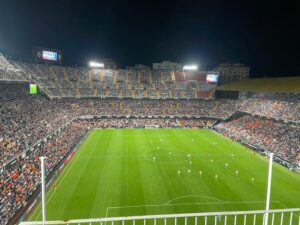
© Jona Sieberg
Accommodation & Living Expenses:
I found searching for accommodation from Germany, without knowing Spanish, to be quite challenging. While many recommended Idealista as the best possible website, where you can find a lot, I ultimately found my apartment through Uni-Places. Although there was a fee involved, it also provided a certain level of security against scams. I live incredibly centrally, not really close to the university, but with the free public transport (for people under 30), I can reach my workplace in 35 minutes. However, I have found Valencia to be very well connected, so the exact location of your flat is not so important.
When I first started looking for an apartment I would have liked to live alone, but decided to go for the cheaper option of a shared flat. In retrospect I would now strongly advise everyone to do the same. Social interaction and contacts are one of the core elements of an Erasmus stay, which should not be missed at any point. Based on my experience with shared accommodation and hearing about others’ experiences, there will always be pros and cons, but I have not heard from any situations that were unbearable.
Sidenote: During the summer months, a room without air conditioning is maybe somewhat bearable but not very desirable.
Monthly expenses for groceries in the supermarket are certainly somewhat lower than in Germany, although not by much. The only thing that is a little more expensive than what we are used to is Ice-cream. Everything else depends on your lifestyle.
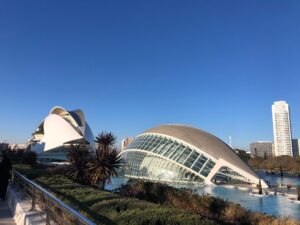
© Jona Sieberg
Prices for shared rooms range from approximately 300 to 550 euros. Clubs are often free through Erasmus organizers, and restaurants and gyms are also slightly cheaper than in Germany.
Everyday Life / The Internship:
My internship itself didn’t really differ from similar tasks in Germany: I worked in the laboratory, sometimes under supervision, mostly independently. Only the feeling of arriving in a group of Spanish people, making friends, and then also doing things together outside of university felt even cooler. I dealt with great people, a relaxed yet dedicated professor, a doctoral student with whom I couldn’t have gotten along better, and a generally very friendly group. The willingness to help each other was high, working hours were very flexible, and hierarchies were flat.
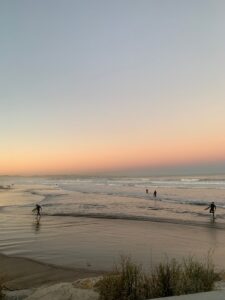
© Jona Sieberg
In this regard, my impressions were minimally different from Germany. I was usually in the lab between just before 10 am and 6 pm, but as everything was relatively relaxed, a lot of it was voluntary. Overall, there was certainly time for sports, activities on the weekends, and enjoying the feeling of living in Spain! I found it to be a great opportunity to expand my knowledge, learned a lot, and certainly gained more confidence in my abilities through the experiences I had.
The biggest difference in everyday life: You don’t have to look out the window to know what the weather is like. Valencia lives up to its promises and offers, although it may not be the most beautiful city in the world, good weather, nearly every day.
My hope was to make great progress in Spanish as well as gaining professional experience. This is perhaps possible if you already speak relatively good Spanish, but as long as English is still much easier for both sides, I had little success. The university, as the place where I spent most of my time, is simply unsuitable for this, as people here speak generally better English than elsewhere.
Free Time / Tips:
Beach, great weather, culture, local markets, the feeling of a big but not too big city, clubs, parks, huge university campuses, and all of it easily accessible. As mentioned, there is certainly no shortage of options. Erasmus organizations offer a particularly easy entry, offering a variety of activities. For example, I participated in their surfing and beach volleyball offerings, parties, and excursions. The excursions, in particular, are very pleasant because you can reach nearby cities or locations relatively inexpensively. Especially the mountains, which are otherwise difficult to reach without a car.
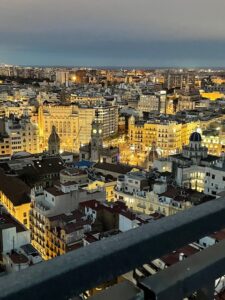
© Jona Sieberg
Valencia certainly does not lack bars where you can sit down nicely in the evening. Additionally, there are also many opportunities to sit outside with your friends. If I were to make a recommendation, I would suggest the very authentic Mercabañal, located very close to the beach.
As an absolute Erasmus hotspot, one should not expect to only deal with spanish people. On the contrary: It is very international, and this is reflected wherever students are. While I mainly dealt with Spaniards in the lab, my roommates and the visitors to clubs and bars were often from abroad.
I used my free time a lot to do sports, often in the gym, partly because it was often much cooler there. Running is a bit less pleasant in Valencia than in Aachen, but with the Turia (the largest park that leads in a semicircle through the city), there is an extremely bicycle and jogger-friendly park. Various football fields are also located here, where people often meet up through WhatsApp groups.
Conclusion:
I can highly recommend Valencia as a destination for an Erasmus stay. At the end of my time here, I feel like I have participated in the hustle and bustle of a Spanish university and made progress in my field, as well as had a great time in Spain. The only thing Valencia doesn’t offer is the feeling of being in a super fancy metropolis with incredibly modern skyscrapers. For everything else you hope for from your stay abroad, Valencia offers the ideal conditions. You just have to do it! Have fun!
Research Internship at DuPont de Nemours in Luxembourg
- Chemistry M.Sc.
- Luxembourg, Contern
- DuPont de Nemours Luxembourg
- 10/2023 – 02/2024
Application/Finding an internship
The Chemistry M.Sc. program at RWTH Aachen University requires three research internships, which can be completed externally, providing students with the opportunity of valuable work and life experience. While students can do an external internship in a specific research group, it is also possible to apply for an external industrial research internship. That is why I thought an internship at DuPont de Nemours in Luxembourg would provide me with valuable insights into the chemical industry, which is a potential career path for me as a chemist. DuPont de Nemours is one of the biggest chemical groups in Luxembourg and worldwide.
I took the initiative to organize my stay in Luxembourg and apply for this internship independently, without any recommendation from a professor or advertisement from the University. In October 2022, I reached out to one of the leading scientists at the company via email and after several months of communication, I was invited to an interview. Finally, in August 2023, I received the confirmation that I had secured the internship. This allowed me to have enough time to plan everything in advance before the start date. Based on my experience, I highly recommend planning an external industrial internship 9-12 months in advance.
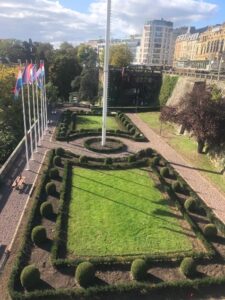
© Leon Maßem
Accommodation & Living expenses
My job was in Contern, a commune in the south of Luxembourg, east of the capital, Luxembourg City (usually referred to as the ‘city’). Finding an apartment close to the city for a reasonable price is almost impossible, as the price per square meter is close to 50€, making it impossible to finance with the Erasmus grant. I was happy to find and live in a small flat in the border area in the north-east of Luxembourg. The rent is lower and the opportunity to go shopping in Germany is very valuable. It is a fact that the cost of living in Luxembourg is 1.5 or even 2 times higher than in Germany for many products. Therefore, it is not surprising that many Luxembourgers prefer to go shopping in France or Germany. However, it is important to note that petrol, coffee, bread or tobacco are exceptions and this leads to fuel tourism in the border regions of Luxembourg. Wasserbillig is a city located on the border with Germany. It has 11 petrol stations, which I found quite amusing. Overall, I was not able to compensate all the cost with the Erasmus Grant and I had to use some of the salary that I got from work. Since the living expenses are that high, everyone should keep that in mind when planning on going to Luxembourg.
Getting around in Luxembourg is incredibly easy thanks to the country’s excellent public transport network, which is completely free.
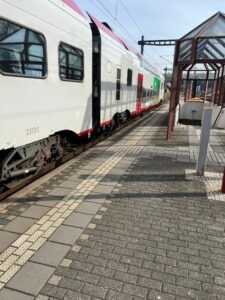
© Leon Maßem
Luxembourg is a relatively small country and the government invests heavily in its public transport system, making it possible to cross the entire country in just one hour or reach the city from the far east in just 30 minutes. This commitment was implemented to reduce car traffic which is a big problem when going towards the city. It’s no wonder that many cross-border commuters choose to rely on public transport when driving to work in Luxembourg. That is why I always chose to take the free train to work and I can recommend everyone to do so as well.
Everyday life/the internship
My contract was for a 40-hour week with 11 days of holiday over 20 weeks. I was pleased with the number of vacation days, especially since former interns at the company had reported receiving none.
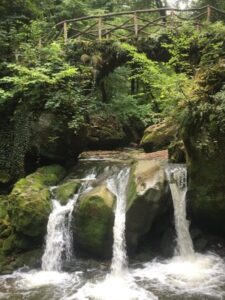
© Leon Maßem
I woke up at 6:00 am each day and left my home at 6:30 am by car. I took the option of travelling to Wasserbillig, which only took 10 minutes, and from there, I could take either the fast RE train (20 minutes to Contern) or the RB train (34 minutes to Contern). Trains arrive alternately every 15 minutes, resulting in a frequency of 4 trains per hour. I got on the train at 6.54am and arrived at Contern station at 7.18am. CFL’s service is highly reliable, better than DB’s and the train was almost always on time. Although, it is worth noting that some RE trains crossing Germany may cause delays. The company is located just a 5-minute walk from the stop.
I was given an electronic key card to enter the site and they are very strict about security. I worked in one of the R&D labs and had my own workstation with a laptop and all the equipment I needed. One of the main advantages was that, although I had to work 40 hours a week, I was able to set my own hours. As I arrived at 7.25am, I was able to leave at 3.55pm, which I loved. The team was very multicultural, from Belgian, Dutch, Greek, French to Irish. The main language of communication was English, which I got quite used to and learnt a lot. Additionally, I was able to improve my French by conversing with native speakers. I really enjoyed the interaction with so many different cultural influences, the openness and diversity. In general, no one looked down on anyone, even with PhD titles, and the atmosphere was productive and it felt like a good collaboration.
The lab itself was top class in terms of equipment and they had very good and many GCs, LC-MS, GC-MS, IR, DSC and much more that you would not expect to find in many research groups in Aachen. Although I cannot talk about my work itself, I can say that you work very independently and they give you space and time to work on your own. I had regular meetings not only with my local colleagues but also with colleagues from the US. I felt very valued and involved in their day-to-day work with my own project. However, you really feel the pressure to produce results as they expect you to present what you have done and thought about in these weekly meetings. I was able to improve my laboratory techniques, enhance my research and collaboration skills, and participate in productive meetings with common problem-solving issues.
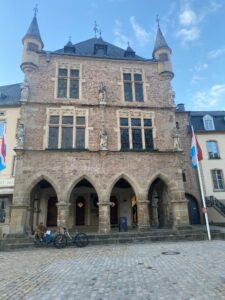
© Leon Maßem
It is definitely difficult to work at university, but I recommend everyone to experience it, as this is what most students will be working on in their future anyway.
Free time/tips
You work a 40-hour week and the work was more demanding than at university. I started in October and left in February, which meant that the sun was almost down when I got home, which made it difficult to do much outside activity during the week. I usually went out on Saturdays and Sundays, although apart from the city itself I found Luxembourg a lot quieter than Germany. However, Luxembourg has really beautiful nature and I would recommend at least visiting the very famous Müllerthal in the east with the Schiessentümpel waterfall if you like hiking. I would also recommend a visit to Vianden Castle in the north-east, which was not far from where I lived. The castle was renovated in 1977 when it was taken over by the state and is very beautiful. You can visit the castle from 10:00 to 17:00 and students only pay 5€. There is also a medieval festival which is very famous but unfortunately only in the summer so I cannot tell you about it.
The oldest city in Luxembourg is Echternach and it is indeed very romantic and has beautiful historic buildings. I also enjoyed the nearby Echternach Lake, where you can go swimming in the summer. There are many different walking routes around the lake and they have tried to place many activities around these routes such as skill runs or giant trampolines. The city of Trier (Germany) is only about 30 minutes east of Luxembourg and is worth a trip if you like Roman buildings. If you are visiting Luxembourg, you must visit the city as this is where the main activities and shopping centre are. It only took me 30 minutes from Wasserbillig, the city is worth a full day trip. The city is divided into the lower and the upper part a
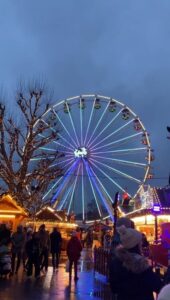
© Leon Maßem
nd I would recommend to start with the lower part and work your way up (you have to walk a lot of stairs though). The upper part has a lot of shops, but as the cost of living is so high, the prices are absurdly high. Be sure to visit the Grand Ducal Palace, as Luxembourg is still a hereditary monarchy and this is the city residence of the Grand Ducal family. A little further out is the Kirchberg area, which is the city’s banking and financial district. Luxembourg City is one of the three seats of the European Union. You can visit the European Court of Justice, the European Court of Auditors and the European Investment Bank. It is in direct contrast to the older city centre, but I still enjoyed it.
I joined a local football club that works with Germans and we met weekly. I would recommend asking around in your area as this helped me to get in touch with the locals and I enjoyed every time we met. Many even smaller villages in Luxembourg offer free sports facilities, so make sure you find out about them. I also went to the Christmas market in the city. When you enter from the train station, you make your way to the Place d’Armes, where most of the market takes place. It is interesting that they have rides like a giant wheel but again everything is very expensive and crowded. I enjoyed it but to be honest I prefer the Christmas market in Aachen.
Conclusion
Looking back, I am incredibly grateful that I had the opportunity to do a research internship within a company in such a wonderful country during my studies. I am happy that I am growing as a person and that I have made wonderful memories in Luxembourg in so many beautiful places all over the country. Although the country is small compared to its neighbours, it offers a diverse cultural density and beautiful nature. I believe that going to another country all by myself and working independently on my own project has helped me develop and is useful for my future. A disadvantage was definitely the high cost of living in Luxembourg, which limited some activities I wanted to do. However, I would highly recommend Luxembourg to anyone and will definitely visit the country again.

